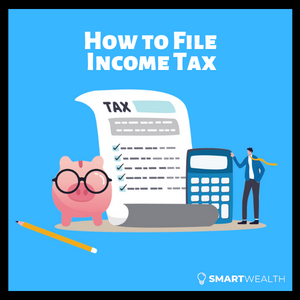Is it your first time filing your personal income tax?
Or did you recently experience a huge change, either in your job (e.g., moving from public sector to private sector/employee to self-employed) or family (e.g., new baby).
If so, this simple guide will bring you through all the key areas you need to take note of, and understand how to navigate this.
So, read on!
What’s the Tax Filing Deadline in Singapore?
Most residents in Singapore would start receiving letters from IRAS around early March.
These letters (or e-notices) would be your first reminder of compiling all your necessary documents to file for your taxes.
Typically, all tax filing is due by mid-April (15th April for paper filing, 18th April for e-filing).
You may begin the process as early as 1st March, but you are required to finish it by mid-April. If you don’t, there is little room for ask for an extension, or to claim any tax reliefs or deductions.
There are 2 ways of filing – e-filing and via a paper return. Most people generally choose the e-filing route for convenience.
SIDE NOTE When was the last time you conducted thorough financial planning or reviewed your finances? In this day and age in Singapore, doing so will absolutely improve the quality of life for you and your loved ones. Here are 5 reasons why financial planning is so important.
Do You Need to File Income Tax?
If you have been working for a while, you may be wondering if there is a need to file your income tax in the first place.
The simple answer to this is – likely yes, you have to file for income tax as long as you are earning a total of income of more than $22,000, have a self-employed income of more than $6,000 in net profit, or you are a non-resident earning an income derived from Singapore.
Generally, you must file income tax as long as you receive a notification from IRAS informing you to do so.
However, do you need to go through the process of manually filing it every year?
Many Singaporeans working in the public sector or under large companies who are enrolled in the Auto-Inclusion Scheme (AIS) would have their incomes already pre-filled by their employers.
This is a service by IRAS to simplify the tax filing process. You would still need to check that the details are entered accurately, and also to include other sources of income and/or other personal tax reliefs.
How to File Taxes: 3 Categories You Need to Know
1) Income
What is considered income?
In the IRAS website, income constitutes four areas:
- Income earned from employment
- Income from trade, business, profession, or vocation
- Income from property or investments
- Any other sourcres of income
It is worth looking at the list under the fourth category. Some of the listed sources of income, such as lottery winnings, are not taxable.
What may not be taxable is income earned overseas but received in Singapore. You may also be eligible for a double taxation relief. If this applies to you, you can refer to this website for more information.
2) Deductions
Tax deductions include four areas: reliefs, rebates, donations, and expenses.
The government gives out these deductions to “encourage social and economic objectives such as filial piety, family formation and the advancement of skills”.
If you engage in any one of these four areas (or all four of them), you should make it a point to file for deductions so that you pay less tax. For example, if you donate regularly to approved charities, you would be eligible for a 250% tax deduction.
DID YOU KNOW? According to a survey conducted by MoneySense, about 3 out of 10 Singapore residents aged 30 to 59 had not started planning for their future financial needs. This isn't surprising because personal finance can seem complicated and daunting. But really, there are only a few things that you should focus on. Learn how to significantly improve your personal finances with the 7-step "wedding cake" strategy today.
3) Reliefs
Under deductions are an important category called personal reliefs.
There are many different personal income tax reliefs meant to support the family and personal advancement of skills. They come in different shapes and forms, and some can be directed towards working mothers in singapore. You may refer to our summary on the different types of tax reliefs available to Singapore residents.
Note: Since 2018, there is a maximum cap of $80,000 in tax deductions and reliefs.
Double-Check Your Entries and File It
After you’ve gone through all the areas above, it is important to double-check your entries to ensure it is accurate. Most importantly, you must click “submit”, if you are submitting it online.
If you don’t meet the deadline, the following consequences might be meted out:
- You have to pay the tax within a month based on an estimated Notice of Assessment (NOA)
- You are charged an “offer of composition” between $150 to $1000 for the offence
- You are summoned to court
Wait for Your Notice of Assessment (NOA) and Pay Your Taxes
Finally, after you have made your submission, IRAS will send you a Notice of Assessment (NOA) on the total amount of taxes due for the year of assessment. If you notice any errors, you must notify IRAS within seven days.
How do you pay for your taxes?
Thanks to the variety of electronic methods available, you can choose your preferred way to make your payment. One of the easiest ways is to set up a GIRO account, so that you don’t have to “remember” to pay the tax every month. Alternatively, if you prefer to pay it in one shot, you can do it via PayNow, Internet Banking, at SAM/AXS and even ATM machines.
Last but not least, you may be wondering if you can refuse to pay your taxes or provide an inaccurate reflection of your chargeable income. There are serious consequences to both.
Late Payment of Tax
If you do not pay your taxes on time, you will be charged with a 5% late penalty. Additionally, “penalties of 1% per month may be imposed if the tax remains unpaid 60 days after the imposition of the 5% penalty. The 1% additional penalty will be imposed for each completed month that the tax remains unpaid, up to a maximum of 12% of the unpaid tax.”
Complete refusal to pay taxes may also result in legal action being taken, and you may not be able to leave Singapore.
Inaccurate Declaration of Income
If you do not file your taxes accurately, especially if you declare an income much lower than what you earn in reality, you might be charged with tax evasion or fraud. In 2021, a Sole Proprietor who underdeclared his income by over $2 million was penalised. He was charged with four offences related to evading taxes, and was ordered to pay a “fine of $16,000 and a penalty of $923,506”. Others have also been fined and jailed for making false declarations. The consequences are hefty. Thus, you should take this filing exercise seriously, and ensure that your tax declarations are accurate.


